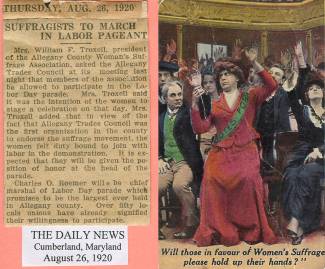Collection Name
About
Mrs. William F. Troxell
On August 26, 1920, the United States Secretary of State issued a proclamation certifying the ratification of the Nineteenth Amendment to the Constitution. For twenty-six million American women, the right to vote became law.
Mrs. William F. Troxell served as president of the Allegany County Woman's Suffrage Association in 1920. The Cumberland Daily News of that same date reports that Mrs. Troxell appeared at the Allegany Trades Council at its meeting the night before to seek permission to march in the annual Labor Day Parade and that "it was the intention of the women to stage a celebration on that day." Troxell noted that the Trades Council was the first organization in the county to endorse the suffrage movement and that the women felt "duty bound to join with labor in the demonstration." Permission to join the parade was approved, and the newspaper reported that the women were expected to be given a place of honor at the head of the parade.
Research done by local historian Dan Whetzel indicates that Mrs. Troxell also served as treasurer of the Just Government League of Allegany County when it was formed in 1911. The county league’s formation was announced at a meeting held at the Emmanuel Episcopal Church Parish House in Cumberland. The Just Government League was closely tied to the suffrage movement.
Text: From the Cumberland Daily News, August 26, 1920.
Women’s Suffrage Postcard postmarked February 27, 1915 and from the collection of Angela and Albert Feldstein.
In Rose Hill Cemetery, Cumberland, is the grave of William Fillmore Troxell, "died 1 Mar 1923, Son of John Troxell & Christiann Sponseller. Druggist & Tenor. Married Anna Belle Darr, 1886." It is possible that the Mrs. William Troxell, president of the Allegany County Woman's Suffrage Association, was Anna Belle Troxell.
FOOTNOTE: It was recently brought to my attention that there is considered to be a difference between the terms “suffragist” and “suffragette.” Apparently they tend to imply a difference in meaning from an historical perspective. Suffragists were defined as people who supported enfranchisement, in other words, the right to vote. Suffragette was seen as a somewhat derogatory and offensive term and used mockingly by anti-suffragists. This appears to be confirmed somewhat in reviewing several of the postcards and newspaper articles that are posted here.
